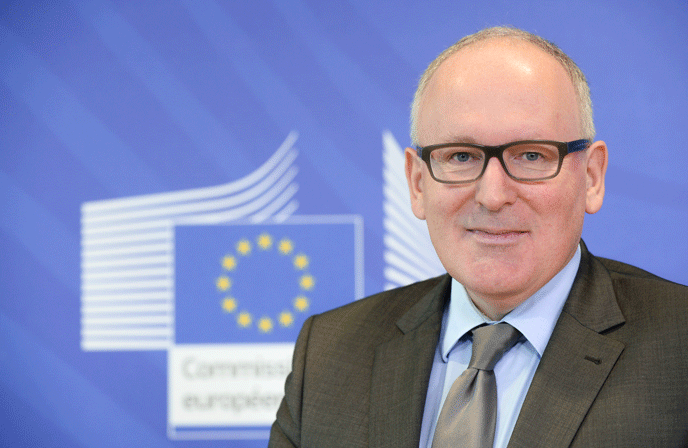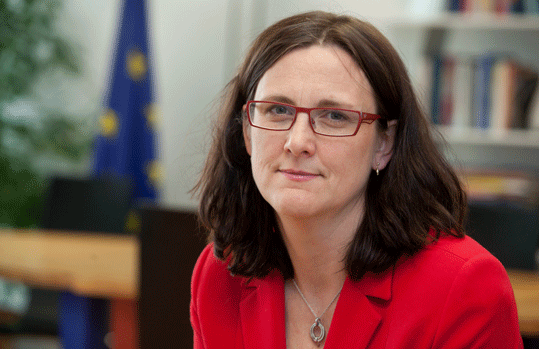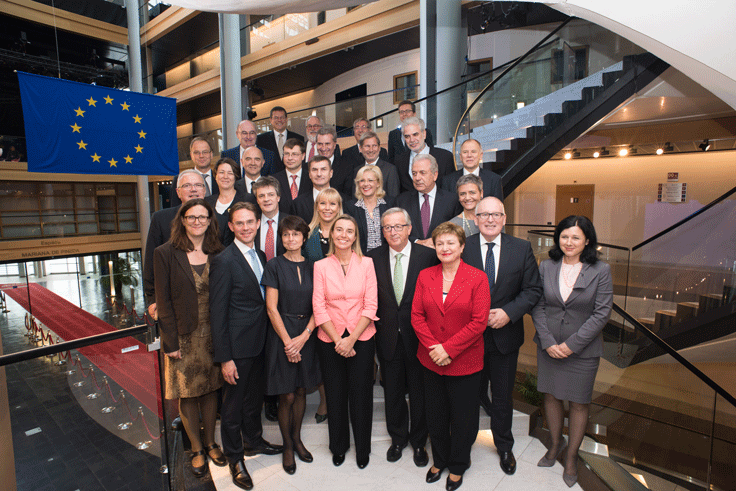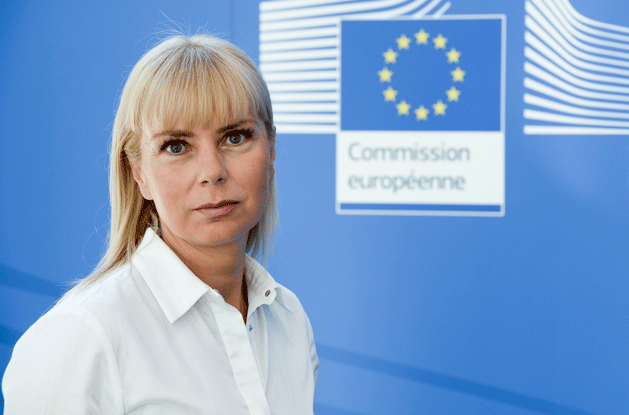The low down on three more figures from the new European Commission: Frans Timmermans, Cecilia Malmström and Elżbieta Bieńkowska provided by Jules Meunier, Business Manager in the Chamber’s Shanghai Chapter, in the second of this ‘Who’s who?’ series.
Frans Timmermans
Position: First Vice President, in charge of Better Regulation, Interinstitutional Relations, the Rule of Law and the Charter of Fundamental Rights
Age: 53
Nationality: Dutch
Party: S&D – Socialists & Democrats (centre-left)
Frans Timmermans is the first ever first vice president of the European Commission – a brand new position created by President Juncker. Although in charge of Better Regulation, Interinstitutional Relations, the Rule of Law and the Charter of Fundamental Rights, it is mostly as Juncker’s official ‘right arm’ that he is already playing a central role in the new Commission.
Timmermans’ vast experience and well-respected credentials saw him gain smooth confirmation by the European Parliament. A fluent speaker of French, English, German, Italian and Russian, in addition to his mother tongue, was already well-acquainted with the Brussels bubble having served as a member of the private office of former Dutch Commissioner Hans Van den Broeck. He served as a Member of the Dutch Parliament (Labour Party – centre left) from 1998–2007 and again as Dutch foreign minister from 2010–2012, until his designation as EU Commissioner.
His first task is to cut red tape and deliver better regulation.[1] As such he is championing a new round of subsidiarity: transferring back to the member states powers related to technical issues or topics that are not of major importance for the EU as a whole, which should focus on the ‘big things’ earmarked by President Juncker. He has already taken action with the draft Programme of the European Commission for 2015 – he is planning to cancel or postpone about 80 legislative proposals that were in preparation, including a number related to environmental issues. He will also be reviewing existing European legislation and amending it in a ‘Better Regulation’ package proposal before the end of 2015, ensuring that from now on, every Commission proposal or initiative complies with the Charter of Fundamental Rights.
He will also be in charge of transparency and relations, setting a new framework for the Commission to work with lobbies. The first significant step is the creation of a mandatory lobby register covering the Commission, the European Parliament and the Council.
Even though, due to his portfolio, he is expected to focus efforts within the EU, Timmermans is not new to China. As Dutch Foreign Minister his last trip to Beijing was in June 2013. He has been tasked by President Juncker to review and approve the compatibility of any possible special regimes for investor-state disputes (ISDS) in future EU trade agreements, which will be part of the ongoing negotiations for an EU-China Bilateral Investment Agreement (BIA).
Creating the role of first vice president was one of the major innovations of Juncker’s Commission, and Timmermans will be an essential part of this new organisation.
Cecilia Malmström
Position: Commissioner for Trade
Age: 46
Nationality: Swedish
Party: ALDE – Alliance of Liberals and Democrats for Europe (centre)
Cecilia Malmström is one of the seven returning Commissioners from the Barroso II Commission, where she had been in charge of internal affairs. She was selected by President Juncker to be in charge of the Trade Portfolio, which she had requested. She has very strong European experience and reaction to the nomination of this pro-trade, consensus-building Swede was positive. She lived in France, Germany and Spain before being elected as a Member of the European Parliament (ALDE) from 1996–2006, where she was involved in the committees for Foreign Affairs, Human Rights and Union Enlargement.
As the functional head of the Commission’s trade portfolio, Malmström succeeded Karel De Gucht as de facto leader of the Transatlantic Trade and Investment Partnership (TTIP), which is one of the Commission’s 10 priorities defined by President Juncker.[2] Her first challenge was to save the Comprehensive Trade and Economic Agreement (CETA) between the EU and Canada – although negotiations were already concluded the ISDS mechanism had drawn some criticism.
The ISDS mechanism is now the most prominent obstacle to advancing negotiations with the United States on the TTIP, and it will certainly be her top priority. During her confirmation hearing in front of the European Parliament, she committed to ensuring the transparency of the negotiations and the disclosure of documents and the negotiating mandate. This should become the standard procedure for negotiations of all trade or investment negotiations the Commission is conducting with third countries, including China. Timmermans has been tasked by Juncker to oversee and approve any ISDS mechanism to be included in all future trade negotiations led by the Commission. Malmström presents the results of the European consultation on ISDS to all Commissioners in January 2015, and it will be on the agenda of the next meeting of European Trade Ministers in May 2015.
Malmström will work in particular on projects steered and coordinated by Jyrki Katainen, Vice President for Jobs, Growth, Investment and Competitiveness, and Vice President Federica Mogherini, High Representative of the Union for Foreign Affairs and Security Affairs.
EU-China diplomatic relations celebrate their 40th anniversary in 2015, and Malmström will play a key role. She will first be representing the EU at the World Trade Organisation—where her predecessor was known for taking a strong stance against China on trade disputes—and the issue of granting China Market Economy status will inevitably be raised. In terms of a free-trade agreement with China, she clarified that it will be a long way down the line – completing negotiations on the BIA is her priority where China is concerned.
Elżbieta Bieńkowska
Position: Commissioner for Internal Market, Industry, Entrepreneurship and SMEs
Age: 50
Nationality: Polish
Party: EPP – European Popular Party (centre-right)
Before being designated as Commissioner, Elżbieta Bieńkowska was Deputy Prime Minister and Minister for Infrastructure and Regional Development of Poland. Even though she defines herself as a technocrat and not a politician, she is a prominent face of Polish politics and was in charge of managing the European funds in her country, which is the biggest recipient in Europe. She also used to teach at the Polytechnic School of Silesia.
Her nomination is perceived as a strong signal of the key role given to Eastern European countries in the new Commission. Even though she does not have the title of Vice President and will mostly work under the supervision of Jyrki Katainen, Vice President for Jobs, Growth, Investment and Competitiveness, she is expected to be at the frontline of the Commission’s work being in charge of the most powerful tool of the EU: the internal market.
Compared with the previous Commission, her portfolio has lost the responsibility for financial services, but she will oversee an office that is born from the merging of two powerful Directorate Generals – Internal Market and Services (DG MARKT) and Enterprise and Industry (DG ENTR). Furthermore, the Office for Harmonisation of the Internal Market, in charge of trademark and designs, will also report to her.
Bieńkowska will be tasked with “extending the principle of mutual recognition in the single market, designing new policy measures to address remaining obstacles to a fully functioning single market for goods and services,” as well as “raising the profile and importance of industry in the economy from less than 16 per cent today to 20 per cent in 2020.”[3]
She already announced her top priorities, which will be health industries, digital agenda, energy union—also top of the agenda of the new Latvian Presidency for the first half of 2015—and SMEs. She will ensure that that all the areas under her responsibility are treated in an integrated way as they all overlap, and she has committed to accelerate and simplify future and existing legislation.
Bieńkowska’s motto is “let’s get Europe to work”, and early 2015 she will be proposing a roadmap to support the competitiveness of European industry, as well as a revised Small Business Act for Europe, including an integrated European strategy for SME internationalisation. Her staff is currently analysing the list of the top 10 most burdensome legislative acts for SMEs to decide on acts that should be abolished as priority, to address the fact that only 13 per cent of SMEs are effectively exporting outside of the EU.
[1] ttp://ec.europa.eu/commission/sites/cwt/files/commissioner_mission_letters/timmermans_en.pdf
[2] http://ec.europa.eu/priorities/eu-us-free-trade/index_en.htm
[3] http://ec.europa.eu/commission/sites/cwt/files/commissioner_mission_letters/bienkowska_en.pdf







Recent Comments